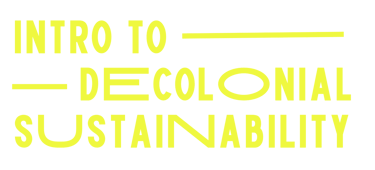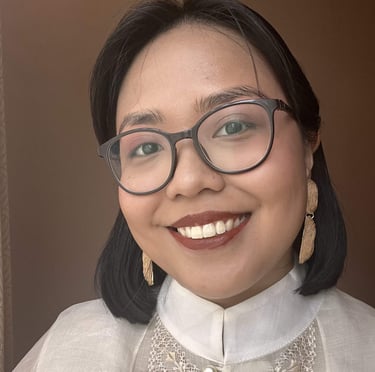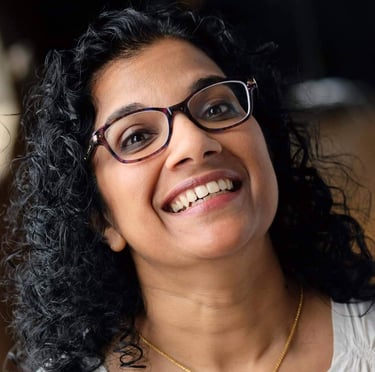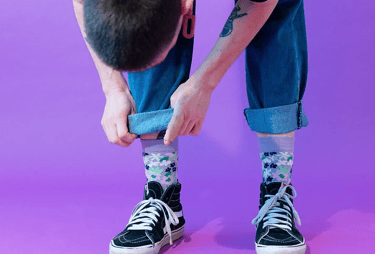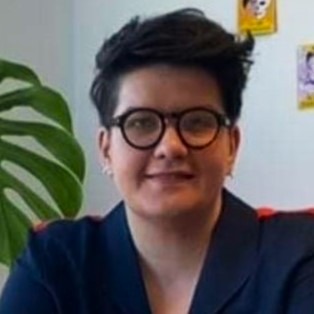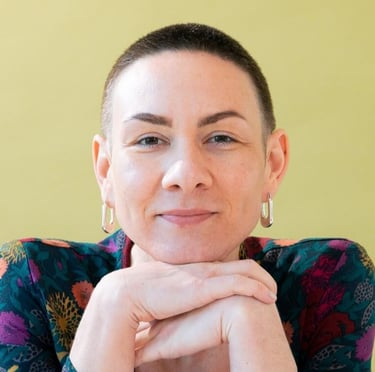

Lavinia
Lavinia Muth works at the intersection of justice, sustainability, and power. Having spent 13 years in corporate sustainability roles focused on fashion and consumer goods, she began “breaking up” with the industry in late 2021. Her journey has taken her from compliance-heavy roles into interrogations of coloniality and the systems that perpetuate injustice.
Lavinia has twice participated in the Intro to Decolonial Sustainability course, an experience that continues to challenge her approach. Her work now centers on creating spaces where learning, questioning and unlearning happen collectively. Whether working with companies, civil society organizations, or individuals, she focuses on understanding and confronting the colonial roots of sustainability practices.
Her coaching has no fixed style or framework - it is intentionally fluid, grounded in active listening, mutual interrogation and co-creation. There are no quick fixes or predetermined answers.. Follow-up emails and conversations are part of the process, ensuring support continues after the initial session.
Specialty Areas
Lavinia’s work transcends sectors, addressing systemic issues across textile supply chains, agriculture, and beyond. She offers expertise in:
Understanding coloniality: Supporting organizations and individuals in understanding their own coloniality, often beginning with workshops and evolving into collective, ongoing engagements where Lavinia serves also as a continous co-learner.
Rightsholder Involvement: Building strategies to center rightsholders by corporate practices, to understand how power is redistributed.
Beyond Sustaina-Bullshit: Moving past surface-level sustainability narratives to focus on justice, accountability and systemic change.
Greenwashing Decoded: Critically analyzing corporate sustainability claims, exposing manipulation and fostering transparency.
Limits of Certifications and Standards: Unpacking the constraints of certifications to shift away from compliance-driven approaches.
Exploring inquiries like...
“How can I critically decode greenwashing and hold my organization accountable?”
“We want to confront our organization’s colonial history but don’t know where to start.”
Book a session
Lavinia offers 60 or 90-minute sessions, tailored to individuals or groups across sectors. These sessions are designed for those grappling with complex challenges in sustainability, human rights due diligence and ecological transformation.
Supply Web Mapping: Expanding beyond linear supply chain thinking to embrace complexity and interdependence, identifying ethical and practical interventions.
Radical Corporate Activism: Assisting folks and/or teams within organizations to challenge entrenched structures and build networks for connection and internal and external activism.
“I work with certifications, but I see their limitations. Is it possible to use these tools for systemic transformation?”
“How can we genuinely involve rightsholders in decision-making processes rather than simply consulting them?”
“What does it mean to move beyond compliance and reframe supply chains as interconnected supply webs?”
“How can I navigate my complicity in systems I’m working to change and how do I motivate others to join me and/or is it my responsibility to motivate others?”
To book, visit Calendly or email her directly at lavinia.muth@posteo.de. Please share some context about your situation, what prompted you to reach out, and your goals or specific requests. Sessions are available in English, Spanish and German.
Beyond the session as part of DecSust, Lavinia works on a pay-what-you-can basis, offering community contributions, student rates, and professional tiers to ensure accessibility.

Vidhya
My name is Vidhya Shanker, and I’m an interdependent, intersectional, and interdisciplinary evaluation practitioner, scholar, organiser, and activist. I’m (not uniquely) the product of many overlapping, intersecting, and sometimes conflicting personal, pedagogical, professional, and political forces.
I’ve spent the last 20 years sustaining my family and a larger community by selling my intellectual labour — research/ evaluation services and knowledge products — to organisations and governments within the nonprofit/ nongovernmental industrial complex. I started my own practice by necessity, upon being fired at the height of COVID and in the midst of the 2020 uprisings because my last employer objected to my public discussion of persistent racial stratification — demographic, ideological, and epistemological whiteness and White supremacy — in, through, and around evaluation.
Specialty Areas
I won’t provide you with any magic methods, dripping with “culture”, because methods cannot be truly “decolonized” if they are being applied within colonial structures—which they would be for the immediate future. They simply provide a distraction, anaesthetic, or intoxicant. To co-create our POSSIBLE long-term future, though, I can offer reflexive praxis (theory, action, dialogue) around the following:
Deconstructing Taken-for-Granted Assumptions and Norms Regarding Research/ Evaluation and Project Management
Concepts, language, and practices from research and evaluation that will help you to use terms that may have currency within your field (buzz words) with intentionality — knowing where they come from, who came up with them, when, and why— and using them carefully. These may include “mission", "goals", "risk", “SWOT analysis", “impact", “cost-benefit analysis", “ROI", “mixed methods", “qualitative data", “cultural competence", “equity", etc.
History, context, and citations that you can use to argue for or against particular approaches with your colleagues and to push back against managers and funders who require or impose or take for granted particular approaches, methodologies, standards of evidence, timelines, budgets, and ways to organise labour.
Deconstructing Imperialism/ Coloniality/ Racial and Gendered Capitalism (including Philanthropy & International Aid) in Relation to Research & Evaluation
The calculus underlying endowment investments
Racial formation theory, dimensions of White supremacy, and faces of oppression
Intersectionality and data disaggregation
Nested levels of expected change and units of analysis
Life-Affirming Bodies of Knowledge/ Ways of Knowing to Support Resistance/ Emancipatory Work and Accountability
Structures and processes for organising work/ time/ money in ways that support shared decision making, shared benefit, and shared labour.
Nonviolent communication (it’s not what most people think it is), including bodily and sensory awareness and contemplative and reflective practice.
Relational spiritual and ethical traditions (e.g., Buddhism, Ubuntu).
Abolitionism, transformative justice, community organising, mutual aid, cooperative economics, and generative networks.
Permaculture and systems thinking (critical as I am of both, for reasons that we can unpack together).
Exploring inquiries like...
How to conduct research to show a problem in ways that don’t reinforce unhelpful tropes?
How to measure results and wield data/ metrics/ KPIs/ etc. to show “impact” (and lack thereof) to hold ourselves and others accountable in ways that do not buy into (neo)liberalism and (post)positivism?
Book a session
To engage in coaching with me, please reflect on whatever resources you do have available and whatever you may owe as well as what your ancestors may have already paid. Where/ who do those resources and debts come from? Consider the many types of capital that you may have gained, may need to pay back, or may be making up for having lost.
*** Vidhya is more available from mid-September for coaching.
How to democratise knowledge production and honour different ways of knowing?
I have payment options ranging from $85 USD to $485 USD for 45 minutes of coaching + a post-session reflection and summary of resources. The sliding scale also reflects my preference for relationality rather than transactional and extractive engagement.
My first partnership as an interdependent consultant led to a report on harm and the M&E cycle. In response to my experience in the field, I founded The May 13 Group, which is an emerging ecosystem — a cooperative, solidarity economy — oriented toward and energised by epistemic healing and wholeness. The May 13 Group draws from my doctoral research and builds on the years of unpaid field-changing organising and activist work that I have engaged in within the discipline, occupation, and practice of evaluation.
Like probably all of us, I’m what postcolonial theory calls a hybrid. I have a Master’s degree in Public Affairs, concentrating in Nonprofit Management, which I supplemented with a self-designed secondary concentration in Race, Class & Gender in Global Perspective because the program included no coursework that addressed systems of oppression. My undergraduate degrees are in Fine Arts and Art History. I bring my arts background with me wherever I go. It is a central thread of my identity, as is my lifelong fascination with the interconnections among maths, science, spirituality, art, and social/ cultural/ economic/ political systems.
Anti-colonial, Anti-capitalist, Abolitionist Approaches to Support Research/ Evaluation as part of Resistance/ Emancipation Efforts
Concepts, language, and practices derived from critical theories and traditions of resistance/ emancipation that will support you in thinking, talking about, justifying, and doing research as well as measurement/ evaluation/ “accountability” in ways that embody mutuality and that build collective power among those suffering, surviving and struggling at the confluence of more than one system of oppression.
Alternative/ expansive approaches to situation analysis, program design, implementation, project management, and ongoing critical reflection, dialogue, and accountability.
Writing requests for proposals/ requests for qualifications/ terms of reference/ scopes of work, contracts, consent forms, etc. differently, as a commissioner of research/ evaluation in ways that challenge all we’ve been taught and likely inevitably internalized.
Responding to the above processes differently, whether as a practitioner of research/ evaluation or as an organisation whose work is being researched/ evaluated.
If you are considering coaching with me, please email me (vidhya@whyisevaluationsowhite.info, with the subject “Possible Futures Decolonizing Sustainability Course Coaching Inquiry”). I will then share more information that I hope will help you decide how much to pay, schedule, and pay. Once you’ve scheduled and paid, I will send you a calendar invitation with call information.
After our coaching call, I will send you a summary of our discussion, with notes/ resources, and a tool for reflection that can serve as the basis for any future calls with me and/or others.

Genica
I sincerely thought I was bringing my formal education in environmental planning and management by creating programs like teaching kids to solve environmental problems using design thinking and biomimicry–until I realized we were stealing from nature for our benefit and it was hegemonic to prescribe solutions.
While I’ve experienced discrimination, I am aware that I have unconscious biases that I have to be mindful of because of my privileges. I recognize that being born into a middle class family puts me at an advantage because I was able to get a bachelor’s degree from a private university. I acknowledge that I also have access to resources that most people usually don’t have. Thus, I want to redirect the power and privilege that I have in contributing to my role at the end of the world (or as most corporate people call it, “purpose”)
MY ROLE AT THE END OF THE WORLD
I want to cultivate human and more-than-human care amidst complexity, complicity, conflict, and collapse, without falling into the trap of privileged self-sufficiency. Currently, I am experimenting with this in my decolonial flowerbed (I’ve no experience playing in a sandbox in the Philippines) that is Care Garden PH.
Specialty Areas
I have experience in intersectional movement-building and learning experience design. But for the purpose of this course, I can only support you in Intro to Decolonial Sustainability. I have gone through the course once so there’s a chance that I’ve experienced whatever unpleasant emotions you’re feeling now–shocked, skeptical, infuriated, pained, shame, powerless, isolated, and overwhelmed. We can discuss how we can navigate your experience of the course in a healthy way.
If you are considering coaching with me, please email me at connectwgen@gmail.com with the following:
Subject: DecSust Coaching Inquiry
What is your goal for this session?
What questions might you have?
Other context that you think might be relevant?
Indicate if you are availing of your first complimentary DecSust coaching session, or if you’ll be paying for your session.
Exploring inquiries like...
I am struggling to grasp course content emotionally and/or cognitively. Can you help me identify barriers that are preventing me from moving forward?
I feel skeptical about the course content but feel unable to bring this up with the group. Can you help clarify some matters?
Sure, the current system isn’t perfect, but at least we’re doing something good. Why do we have to decolonize?
Okay, so the status quo isn’t working. Now what? What’s the alternative? How do you decolonize?
Book a session
Since I was a kid, I’ve been obsessed with developing self-awareness by answering personality tests and getting feedback from peers, just so I can introduce myself in class and answer fields like this About section.
Who am I?
Despite its criticisms, I’ve examined myself in the lens of the Chinese & Western Zodiac, Johari & Nohari Window, MBTI, Enneagram, CliftonStrengths, Tasha Eurich’s Insight, random Buzzfeed quizzes, and whatever new test that gets invented – you name it!. And yet, I’ve always doubted my authenticity and felt like something was missing.
It was only through this course that I realized that what was holding me back was past and ongoing colonization. Who am I if we weren’t colonized?
Growing up in an urban center like Metro Manila, I unknowingly based my sense of self on systems created by colonialism. I thought I didn’t have a “culture”, unlike my friends who came from places like the Samar Province. Now, I see that I was disconnected from my parents’ roots because of their urbanization (moving from a rural to an urban area) and assimilation, hoping to give us a "better life."
POSITIONALITY
Nowadays, I try not to focus on identity politics as our rejection or participation in systems matter more. But if it helps you get to know me better, I can indulge you. I am a Filipino cisgender woman who is queer and “neurodivergent” (or at least I struggle with executive function and my psychiatrist said I had a mood disorder).
My encounters with oppressive systems, including but not limited to sexism and ableism, has led me to strive for a career in alternative education with the hope of fostering inclusive learning spaces. In the past seven years, I have designed and facilitated learning experiences that cut across various advocacies such as gender justice, disability justice, and environmental justice.
Based on this information, I’ll determine whether I can coach you or whether it would be better to refer you to someone else. If I can, I’ll send you payment details, my booking page, and other reminders before our session.
My rates range from $0 to $100 depending on your reflection of your positionality.

Bistra
Specialty Areas
Book a session
A social innovator, entrepreneur and a poet, Bistra dedicates her time to fostering positive societal and environmental change (and questioning all of it, while doing it). Born in Struga, North Macedonia, Bistra was raised in a society of continuous post-communist transition, in a country where even the history is unpredictable. In 2008, frustrated by the state of youth activism and mobility in the Balkans, she became one of the core drivers of a movement in Macedonia that resulted with the most popular youth portal in CEE Region, www.mladiinfo.com.
Her passion for entrepreneurship took her on a journey through Europe, Sub-Sahara Africa, and South-East Asia, developing and managing projects, programs and systems of support for social innovation, with European Commission, UN PRME, UNIDO, Impact Hub network, GSEN and other international partners. She has been involved in the creation and scaling of 5 social impact networks and entities across different sectors in CEE and has shared her experience at more than 170 international events and conferences so far. At the moment, she works as managing partner of Heartbeats Innovation & Communication, a service agency dedicated to regeneration, decolonising and system change. In 2024, she founded www.larger.world, an online community and platform that offers unlearning content and events to folks living in high-income countries.
Understanding power and coloniality, and the single story
Roots and perspectives in social innovation, social entrepreneurship, design thinking, impact investing, impact measurement and impact innovation
Social washing, green washing, impact washing
Community building (online and in-person), art of hosting, facilitation
Contact Bistra at bistra@larger.world on directly on LinkedIn.

